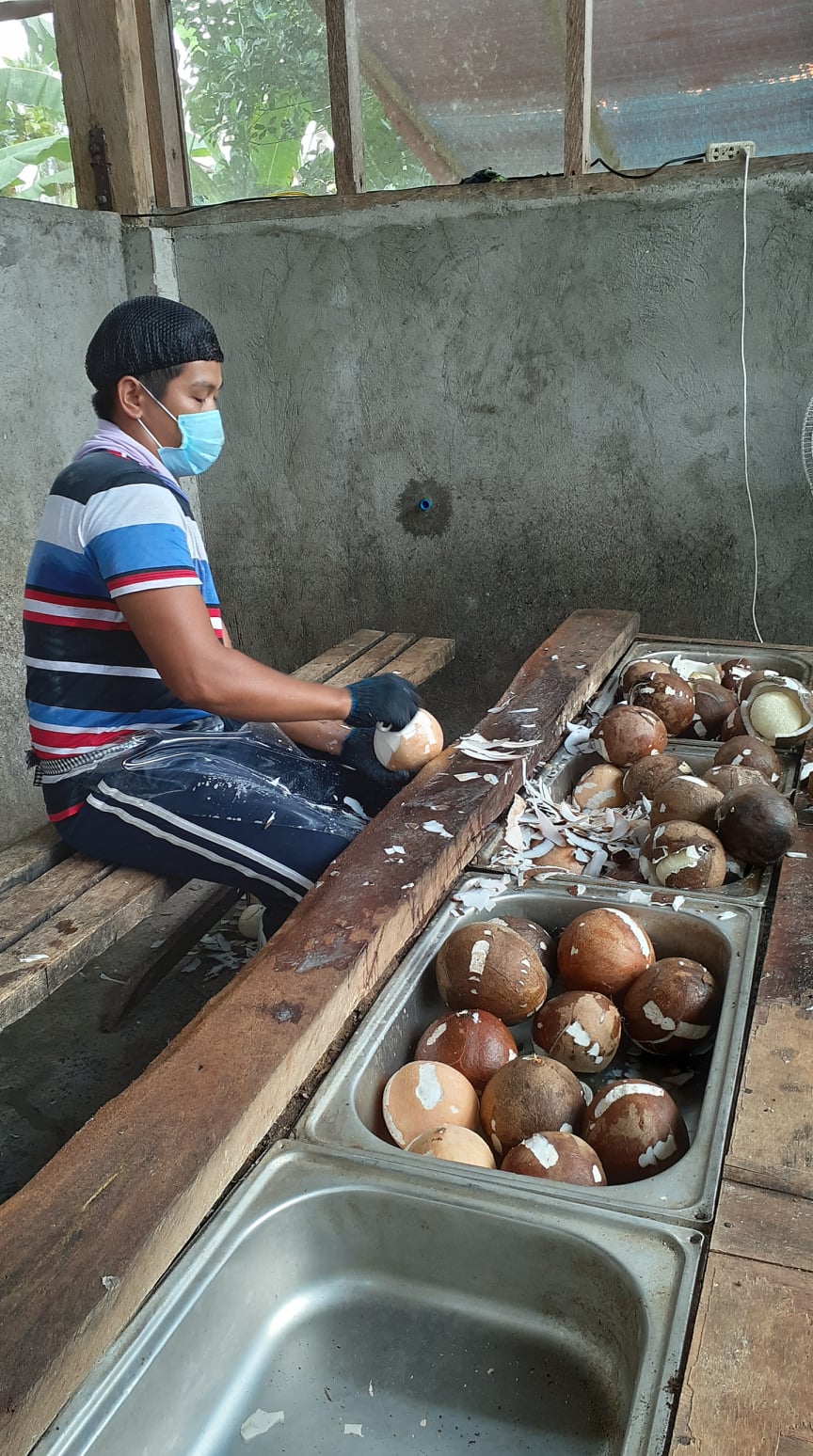
LEYTE, PHILIPPINES – Super Typhoon Yolanda (Haiyan) struck the Philippines in November 2013, taking more than 7,000 lives and affecting more than 14 million people in 44 provinces. With overall damages at USD 5.8 billion, Super Typhoon Yolanda also disrupted the livelihoods of 5.9 million workers and destroyed 33 million coconut trees which are a major source of livelihood in the Visayas. Jaro, Leyte, a town which supplies Leyte province’s vegetables, was one of the many towns that were severely affected. After the super typhoon, only 20% of the coconut trees in Jaro survived.
The Kalipunan ng Maliliit na Magniniyog ng Pilipinas (KAMMPIL) has worked with coconut farmers and has focused on coconut rehabilitation in Leyte since 2014. The towns of Burauen, Kananga, Jaro were the biggest coconut producers in Leyte before the typhoon. Kananga had the highest incidence of poverty among coconut farmers. After the typhoon, KAMMPIL, through the Lutheran World Relief (LWF), responded to the disaster by providing emergency assistance and rebuilding agriculture as a primary source of livelihood. This included planting new varieties of coconuts to replace those that were destroyed by the typhoon. This was done by organizing 10 coconut farmer associations in 10 barangays in the towns of Burauen, Kananga, and Jaro. Each organization had its own seed bank and each town had a communal farm and demo farm for its 10 organizations. Rehabilitation of farms entailed clearing and land preparation through cash for work and planting diverse crops (corn, jackfruit, citrus, ginger, sweet pepper, peanuts, sweet corn, tomatoes). Farmers were given 70 pieces of coconuts which were planted using innovation from the Philippine Coconut Authority (PCA) that makes coconuts more resilient to typhoons. The communal farms for every organization and demo farms for each of the three municipalities served as learning spaces for farmers.
The support from LWF ended in 2016. To strengthen the sustainability of the efforts made, it supported the construction of the KAMMPIL Coconut Integrated Processing Facility and the purchase of equipment for desiccated coconut production. This facility is managed by the KAMMPIL AGRICOOP which was formed by the leaders of 30 coconut farmer organizations in the three towns. Through the facility, the cooperative aims to develop the value chain for coconut, resulting in manufacturing different products and increasing benefits for members.
The work of KAMMPIL under AFOSP-MTCP2 also started in 2016 and focused on the cooperative’s organizational strengthening, capacity building for leadership formation, and cooperative management. Aside from capacitating farmer organizations, the AFOSP-MTCP2 helped address logistical needs regarding planning and writing proposals and coordination and follow up with the government agencies. AFOSP-MTCP2 also helped the cooperative in participating in government platforms and accessing government projects through linkages and networks established with different government agencies.
Currently, the cooperative has 169 members from three towns in Jaro. It produces desiccated coconut and sells it to a company that produces other coconut products. Dried coconut shells are sold to a company that produces activated charcoal. Coconut parings are also sold to producers of animal feeds and crude coconut oil. The cooperative also produces coconut fiber which is sold to a company that makes carpets. Under the MTCP2, the cooperative was able to lobby for equipment for coconut fiber processing from PCA and the Department of Science and Technology and avail training regarding coconut value chain.
At the community level, KAMMPIL and AFOSP-MTCP2 were able to support the different organizations in sustaining their farms and guiding them in engagements with projects from different government agencies in terms of decision-making, planning for livelihood projects, and encouraging active participation of more members.
KAMMPIL and MTCP2 were also able to facilitate the cooperative and coconut farmer organizations in policy advocacy. All the organizations are recognized by their respective LGUs and different government agencies. This recognition enabled the organizations to influence policies regarding the identification of farmer beneficiaries for government projects and paved the way to accessing programs of different government agencies. At the national level, KAMMPIL, as national farmer organization and member of the Philippine Coconut Authority Technical Working Group, National Anti-Poverty Commission, and Leyte Coir Industry, Presidential Agrarian Reform Council, is also able to lobby for the utilization and management of coco levy funds and establish the coco industry road map, thereby creating a venue for coconut farmers to urge the government to intervene with their situation.
By 2021, the coconut seedlings that were planted in 2014 will mature and harvests are expected to increase. This would mean more income for coconut farmers, and more supply of coconuts for the cooperative. The KAMMPIL AGRICOOP is also planning to expand its integrated coconut processing initiative by adding more products that can be produced from coco meat, coco water, coco husks, and coco shells. This can certainly be achieved through their sustained engagement with their different networks and linkages established through the AFOSP-MTCP2.







Comments are closed